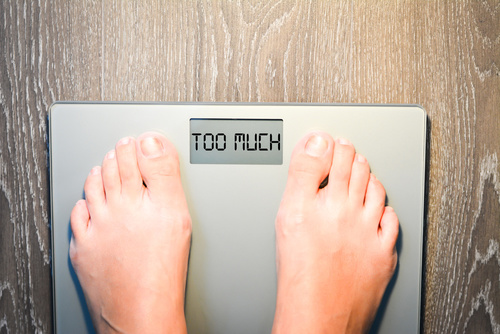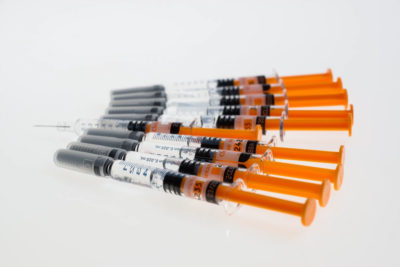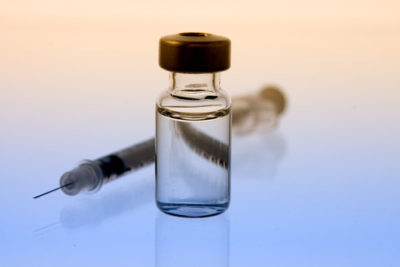Marylee Corliss, 31, had been at the same weight since high school. Considered proportionate to her height, she was always vigilant about maintaining her weight with a healthy diet, gym workouts, weekend hikes or bike rides with her fiancé, yoga classes when she could fit them in and chasing after the 2-year-old she took care of as a nanny. So how could she be gaining weight so much over the past six months that she was now wearing the next largest clothing size?
“I hadn’t changed anything,” Corliss said in frustration about her 11-pound weight gain. “In fact, in the past year, I’d even eliminated red meat, pasta, Sunday bagels and cream cheese, and added olive oil to my diet in place of butter. I cut down on sweets—not easy to do around a 2-year-old who lives for Gummy Bears and cookies.”
Medical experts say there are many reasons for weight gain, besides taking in more calories than you’re burning off, of course. Health issues including hormones, medications, genetics and more can pack on the pounds, so if you’re gaining weight and are certain it is not food-related, a visit to the physician can help determine what the reason is.
Gaining Weight on a Healthy Diet?
First, though, let’s look at some of the “hidden” reasons why what you may think is a healthy diet can actually be sabotaging your weight:
- Snacking on crudites like fresh celery, carrots, peppers, sugar snap peas, cucumber, broccoli and cauliflower is great—as long as you do it without dipping them in creamy (translation: fatty), sugary and/or high fructose-added salad dressings. If you must dunk, opt for salsa, hummus, black bean dip, pesto, Greek yogurt with spices (this one is great with salsa too) and the like.
- While olive oil is touted as the panacea for heart-clogging butter, moderation is key. Though it is considered a healthy fat, olive oil contains 477 calories and 54 grams of fat per ¼ cup. Use olive oil cooking sprays in lieu of the actual thing, when possible, or use a pastry brush dipped in olive oil to lightly glaze foods and baking sheets.
- Love salads? Great. Just watch out for high-fat, high fructose salad dressings—which means most of them, along with add-ins like cheeses, croutons, dried fruit (dried cranberries—a staple of many salad bars—are coated in sugar) and nuts. Make your own salad dressing using a little olive oil, lemon juice, balsamic vinegar and seasonings to taste. Add nonfat Greek yogurt for a creamy texture, if desired.
- Most diets don’t restrict coffee, or if you’re cutting out caffeine, decaf. But be careful not to add cream, whole milk, commercial nondairy creamers and the like. And while those special flavored nondairy creamers may be tempting, in most cases they are loaded with sugar and fat. Better to opt for nonfat milk with a sprinkle of cinnamon. Try adding a touch of peppermint, orange or vanilla extract with nonfat milk and sweeten with stevia for a dessert-like treat. You can use fat-free real cream if you must have that texture, but though this product is devoid of fat, it is still high in calories so use sparingly.
- If ground turkey burgers or boneless, skinless chicken breasts are your healthy eating go-to’s, all’s well in the lean protein department. However watch out for marinades, barbecue sauce and ketchup. Typically all are loaded with sugar. In your search for a super sensational sauce or marinade substitute, hot sauce or red pepper sauce— both of which can be mixed with fat-free Greek yogurt and/or Dijon mustard—can replace the sugary ones without replacing the taste you crave. Also, always broil or bake as opposed to frying, which adds calories and fat.
Medical Reasons for Gaining Weight
Next, if you are adhering to a healthy diet without the above-referenced traps, perhaps these reasons for gaining weight are something you wish to consider:
 Hypothyroidism. An underactive thyroid indicates your thyroid gland is not producing enough thyroid hormones, which impact metabolism. A visit to an endocrinologist who will do bloodwork, including a TSH and thyroid panel, will determine if this gland is out of whack and if you need to be on thyroid hormone replacement therapy. Even a thyroid functioning in the low-normal region can cause weight gain.
Hypothyroidism. An underactive thyroid indicates your thyroid gland is not producing enough thyroid hormones, which impact metabolism. A visit to an endocrinologist who will do bloodwork, including a TSH and thyroid panel, will determine if this gland is out of whack and if you need to be on thyroid hormone replacement therapy. Even a thyroid functioning in the low-normal region can cause weight gain.- Corticosteroids. Long-term use of these medications, often prescribed for asthma and arthritis, and including prednisone, cortef and kenalog—in topical, inhaled, oral or injectable form, can increase appetite leading to a weight gain of as much as 20 pounds or even more.
- Antidepressants. Many of these are connected with weight gain, though if the scale is creeping up, your doctor may be able to switch you to a product that does not produce this particular side effect.
- Cushing’s Syndrome. Said to be very rare, affecting only one in 50,000 people, is caused by high levels of cortisol. It can develop as a long-term side effect of steroid treatment, as with medications used for asthma, arthritis or lupus, or as a result of a tumor. Weight gain in the chest, face, upper back and stomach are common, as fat is redistributed to these areas of the body.
- Antipsychotic drugs. Used to treat disorders including bipolar disease and schizophrenia, this class of drugs can cause weight gain.
- High blood pressure and migraine medications. These are known in some cases to result in additional pounds.
- Antihistamines. Those taking allergy medications like Allegra and Zyrtec were found in a 2010 study to be 55 percent more likely to be overweight.*
- Diabetes treatment. Unbeknownst to many, weight gain is a common side effect for people who take insulin. Research shows it is not uncommon for people with “longstanding” diabetes to consume a diet that “matches” their insulin dosage, which may mean they’re eating more than they need in order to prevent hypoglycemia (low blood sugar).
- Sleep deprivation. According to studies, people who sleep less than seven hours a night may gain weight. Diminished levels of leptin, the “feel full” chemical, are a byproduct of sleep deprivation, as are higher levels of ghrelin, the “hunger stimulating” hormone. Also, put simply, feeling tired as a result of too little sleep can spur you toward reaching for more energy in the form of high-calorie meals and more snacks.
- Polycystic Ovary Syndrome (PCOS). A condition that affects the work of ovaries, symptoms can include irregular periods, difficulty conceiving, excess hair and weight gain—primarily around the waist. The root, though unclear, is thought to be insulin resistance and testosterone.
- Edema (fluid retention). Standing for long periods of time, being pre-menstrual, or taking medications like estrogen replacement therapy produce more common forms of fluid retention. Fluid may be observed in the ankles or in other parts of the body. In its more serious form, edema can cause breathlessness, meaning heart or kidney problems may be the cause.
- Aging. Staying physically active is imperative as we age, because we begin to lose muscle mass. Muscles burn calories. If possible, and even if you’ve never done it before, add weight training to your fitness regimen to build those muscles. Depending on which study you read, the body continues to burn calories for about 24 hours after weight training.
- Have you quit smoking recently? It’s not a cliché that unless there’s a plan in place to redirect some of the behaviors associated with smoking, such as the sensation of something in your mouth and hands, gaining weight may be imminent. That said, quitting does not mean radical weight gain, as studies show it is usually under 10 pounds and that after the first few weeks, you will feel less hungry and more inclined to stay with the new behaviors.
- Gut check. That’s right: Organisms—good and bad bacteria—abound in our gut, and have been known to affect metabolism. Medical experts say the bacteria itself is determined by how we were born (vaginal birth vs. C-section), foods we eat and antibiotic use. Investigating pre- and probiotics can help regulate gut bacteria.
- Lack of sufficient fatty acids. Fatty acids such as those found in salmon and flaxseed oil can help maintain metabolism and curb food cravings.
- Oral contraceptives. Though more common in older iterations of the pill, today’s low-dose models may still result in a few extra pounds, though not to the extent they once did.
- Genetics. Unfortunately, some people are predisposed to weight gain and obesity, even taking all the right precautions.
- Menopause. While it’s not a foregone conclusion that all women going through menopause will gain weight, it does account for additional pounds in many instances. This is because estrogen production declines. Fat cells in the hip, thigh and buttock areas have estrogen receptors. In most women, estrogen drives fat storage to the lower part of the body. As estrogen levels diminish, estrogen loses its hold on fat storage below the waist and it shows up in the waistline.**
Gaining Weight Sources:
- 7 Weird Reasons You’re Gaining Weight
- 12 Eating Mistakes That Are Making You Pack On The Pounds
- Nine medical reasons for putting on weight
- Surprising Reasons You’re Gaining Weight
- 8 Reasons You May Be Gaining Weight Even If You’re Eating Healthy
- * 13 Drugs That Can Make You Gain Weight
- 11 Causes for Weight Gain in Women
- 10 Leading Causes of Weight Gain and Obesity (Besides Willpower)
- ** Menopause and Your Changing Body







